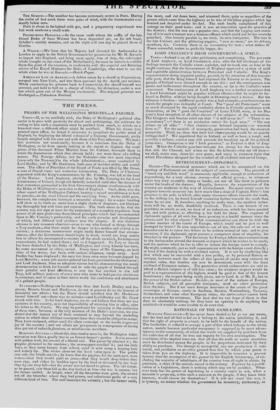RETRENCHMENT—DIPLOMACY.
GLOBE—The economical measures which are to be announced on the opening of Parliament are still the subject of conversation. The proverb of " much cry and little wool" is commonly applicable enough to reductions of expenditure, for a very obvious reason—that official persons, in whatever other way they resemble sheep or lambs, are not all like them in patience under the hands of the shearer. Happily, however, the expectations of the country are moderate in the way of retrenchment. For many weary years its progress towards economy has been much like a stage of Captain Parry's late progress to the pole, in which, after many strenuous efforts towards the north, on the drifting ice, he found himself somewhat further towards the south than when he set out. If, therefore, anything be really done, the smallest reduc- tions will be, no doubt, thankfully received. There is one branch of ex- penditure in which, as yet, we hear of no reductions, which has been pointed out, and with justice, as affording a fair field for them. The expense of diplomatic agents of all sorts has been groWing in a feafful manner since the peace—and for what objects? What communications can there be with the greater number of the courts of Europe, which could not be just as well managed by letter ? In nine negociations out of ten, the only use of an am- bassador can be to cause two letters to be written instead of one, and to give occasion, if the diplomatic agent possess a competent share of stupidity, for blunders in time process. The Secretary for Foreign Affairs must communicate to the Ambassador abroad the demand or request which he wishes to be made, and the motives which he has to offer to induce the foreign court to comply. He might, commonly, just as well communicate with the foreign court. directly; at least if the dealing be with a civilized nation. It is not by chaffering like - that which may be successful with a Jew pedlar, or by personal flattery or intrigue, however much the sellers of this species of smoke may enhance its reputed value, that treaties can now be determined, even with time least
civilized of European nations. The protection which ambassadors are said to aflind to British subjects is of still less value ; for whatever respect would be paid to a representation of the higheet, would be paid to that of the lowest functionary ; the respect being really given, not to Lord A. or Mr. B., but to the power of the British nation. Besides, in most of the nations of Europe, British subjects, and all peaceable foreigners, need no other protection than the laws. But if we need foreign ministers at the courts of the great sovereigns of Europe, surely in Sardinia, Bavaria, Wurtemburg, Tuscany, Switzerland, and some other European states, the ambassadors cannot have even a pretence for existence. The best that we can hope of them is that they do absolutely nothing, • for they have no opening to do anything but mischief—it would be some trouble to do even that.


















 Previous page
Previous page